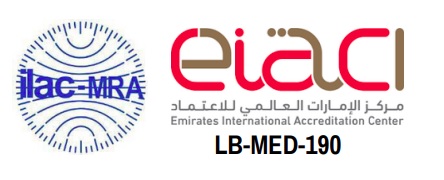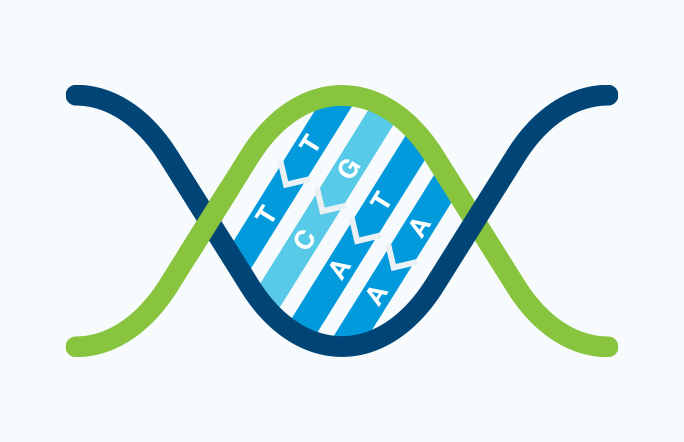Genetic Carrier Screening in Dubai

What is Horizon carrier screening?
It is common for people to be carriers of at least one genetic condition. Carriers are usually healthy; however, they risk passing on a genetic condition to their children. Horizon carrier screening is a type of genetic test that allows you to determine your risk for passing an inherited genetic condition onto your child. Horizon can be ordered before or during pregnancy and is often performed at a DNA test clinic, medical genetics center or other facility.
What is carrier screening?
All of us are carriers of at least one genetic condition. Carriers are typically healthy. Most have no family history of the genetic condition they carry or understanding of how that condition could impact their child. Carrier screening is a type of test that allows you to determine your risk for passing an inherited genetic condition onto your child.
When performed before conceiving, genetic carrier screening provides you with actionable knowledge and the opportunity to pursue alternative reproductive options. Carrier screening during pregnancy (prenatal carrier screening) can also have life-altering benefits: It can help couples decide on diagnostic testing, and if necessary, help them prepare emotionally, medically, and financially for a baby affected by a genetic condition.

Carriers are common, and family history is not a predictor

Family history: not a predictor
88% of carriers of cystic fibrosis (CF), spinal muscular atrophy (SMA), and fragile X syndrome have no known family history1

Carrier frequency
1 in 9 people are carriers when screened with the Horizon 14 standard panel2

Combined incidence
1 in 634 babies are affected by one of the conditions in the Horizon 14 standard panel2

Is carrier screening right for me?
Most people do not know they are a carrier for an inherited genetic disease until they have a child with the condition. Everyone can be a carrier of a genetic condition regardless of ethnicity, family background, or family history.
Genetic carrier screening performed at a DNA testing center or genetics center can help you and your partner learn if you are likely to pass a genetic condition to your child, before or even during pregnancy. With Horizon genetic carrier screening, you screen for one or many genetic diseases in one simple test. Before undergoing carrier screening, it may be helpful to learn more about genetics and inheritance of diseases.
Genetics: The Basics
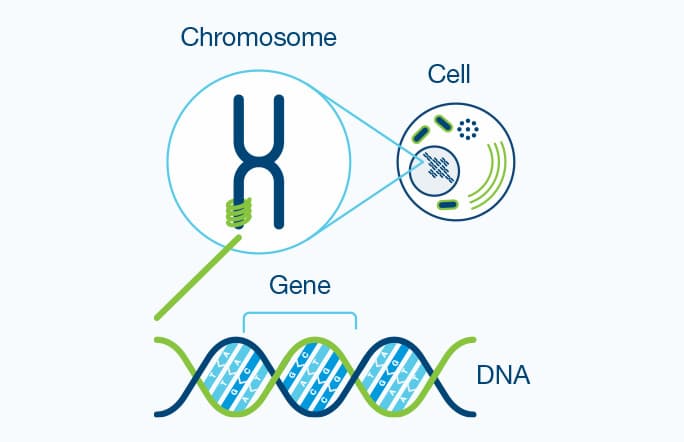
Cells are the basic building blocks of our body. Each of our cells contains our genetic information including thousands of genes that are packaged into chromosomes. Genes are the instructions that tell our bodies how to grow, develop, and function. People have 46 chromosomes that come in pairs. The first 22 pairs are numbered 1 through 22. The last pair, called the sex chromosomes, are different and are called X and Y. We usually get one copy of each chromosome from our mother and the other copy from our father.
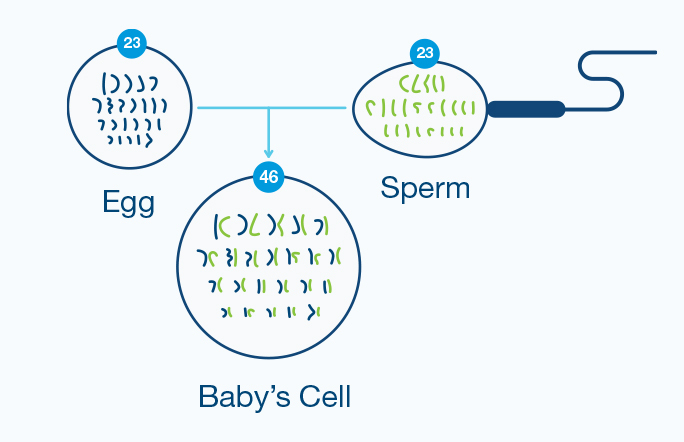
Genes also come in pairs. We inherit one copy of each gene pair from our mother and the other copy from our father. Genes are made of DNA, and DNA is made up of two strands that are wound together like a twisted ladder. DNA strands are made of an alphabet of four letters that are repeated in a certain sequence or order. These four letters A, T, G, and C are called bases. The bases in the DNA pair together, making “base pairs” where A is usually linked with T and G is usually linked with C.
Inheritance: Autosomal Recessive Conditions
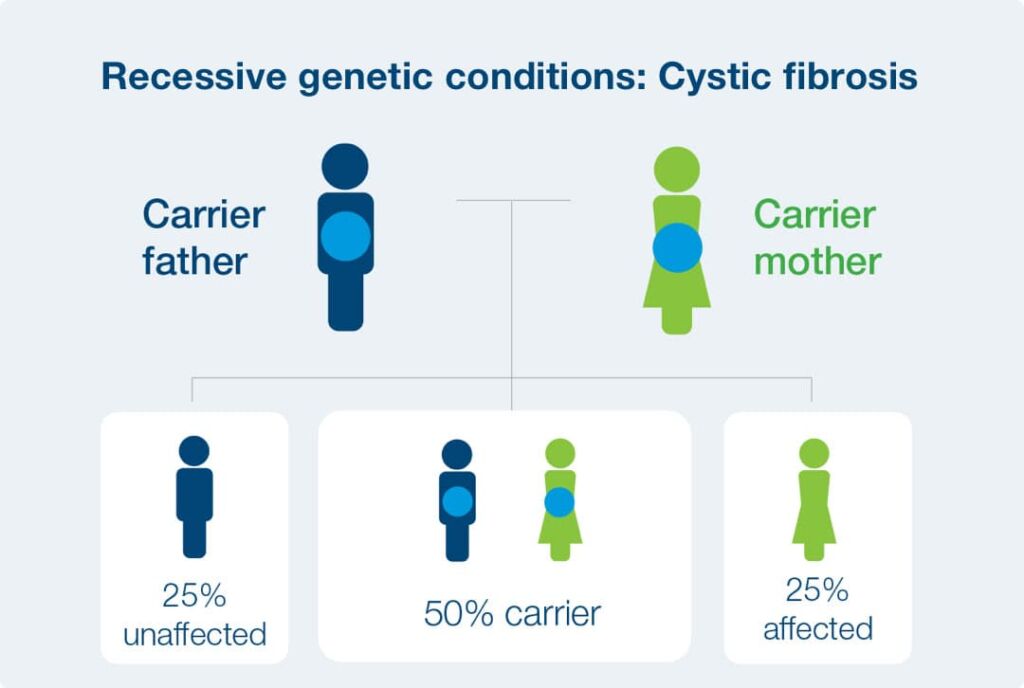
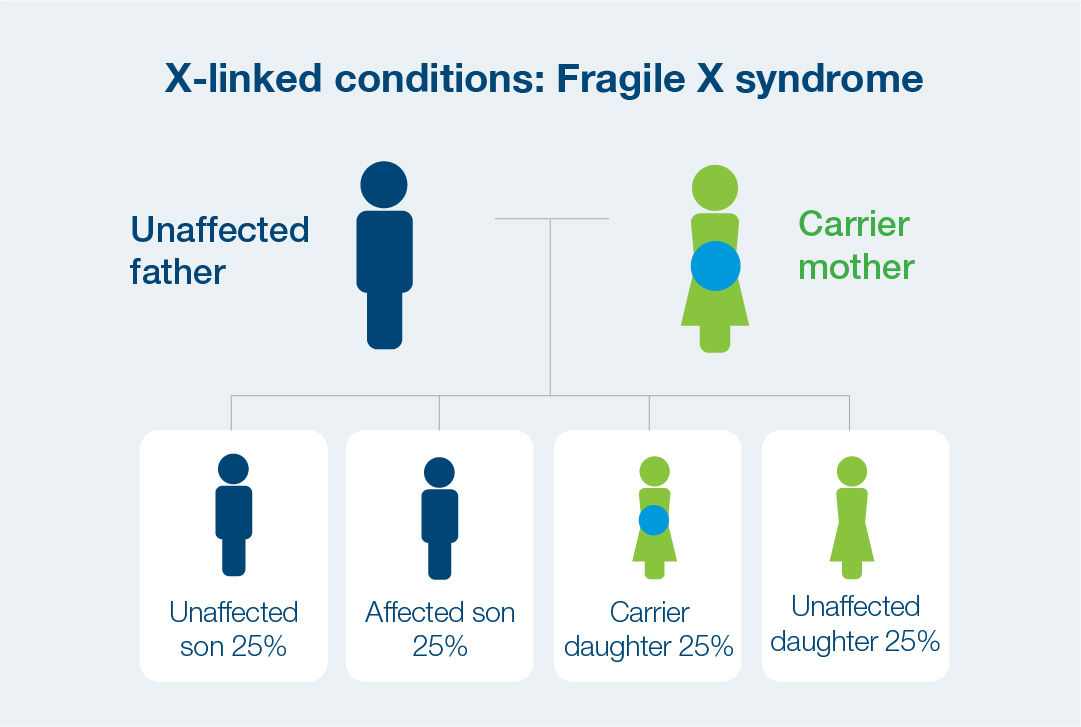
Inheritance: X-linked Conditions
Male or female sex comes from the “sex chromosomes” X and Y. Females have two copies of the X chromosome. Males have one X chromosome and one Y chromosome. This means that females have two copies of each of the genes on the X chromosome and males only have one copy of these genes. Some genetic diseases are caused by mutations in genes found on the X chromosome. These are called X-linked genetic diseases. Females can be carriers of X-linked diseases. This woman has one working copy and one non-working copy of an X-linked gene. Males are not typically carriers because they only have one X chromosome, so they will be either healthy or affected.
For X-linked genetic diseases, only the mother needs to be a carrier to have a chance of having an affected child. This woman’s chance with each pregnancy is 25%, or 1 in 4, to have a son affected with the disease. She also has a 25% chance with each pregnancy to have a daughter who is a carrier. This woman also has a 75% chance to have a child who does NOT have the disease.
What’s next if I am a carrier for a genetic condition?
Patients who are planning to conceive in the future
- Natural pregnancy with or without prenatal diagnosis such as chorionic villus sampling (CVS) or amniocentesis
- Other reproductive options such as: preimplantation genetic testing (PGT) with in vitro fertilization (IVF) to test and then transfer embryos free of the disease that both partners carry, use of a sperm or egg donor, or adoption


Pregnant patients
Why choose Horizon?
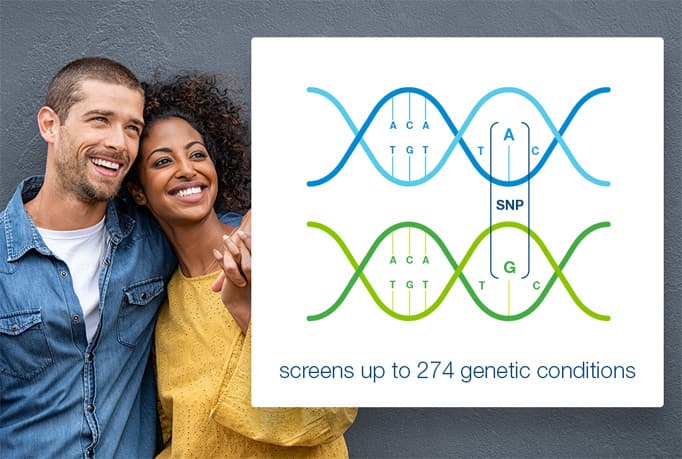
Why Choose PH Diagnostics?




